 | TODAY IN SCIENCE HISTORY NEWSLETTER - 1 MARCH |
| Feature for Today |
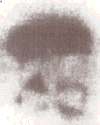 On 1 Mar 1896, as we are often told, Henri Becquerel "discovered" radioactivity. But hold that thought! He had no idea like that. What really happened was that, for whatever reason, he decided to develop what by any rationale of the time, was a blank photographic plate. And he found that it was fogged. And in the shape of the uranium compound crystals that had been sitting on it, in a dark drawer. And his mind was still thinking "phosphorescence" and of the absence of charging with sunlight. And that's all he knew on 1 Mar 1896. On 1 Mar 1896, as we are often told, Henri Becquerel "discovered" radioactivity. But hold that thought! He had no idea like that. What really happened was that, for whatever reason, he decided to develop what by any rationale of the time, was a blank photographic plate. And he found that it was fogged. And in the shape of the uranium compound crystals that had been sitting on it, in a dark drawer. And his mind was still thinking "phosphorescence" and of the absence of charging with sunlight. And that's all he knew on 1 Mar 1896.The next few years were full of wonder. And stumbling around. As this Harper's Magazine article in 1902 shows, a lot had been learned. But not everything. Your eyes will pop when you read, "So powerful is the phosphorescence caused by Becquerel rays that if a tube of radium chloride be held to the forehead, and the experimenter close his eyes, he will still see light." OMG! So, like the Lone Ranger show intro said, "Return with us now to those thrilling days of yesteryear...", say "Hi Yo Radium!" and mount your trusty steed, a time-machine. As you read the article written for the lay reader scant years after the first discovery of radioactivity, imagine yourself to be learning for the first time of this new scientific discovery. X-Rays were discovered only a few months before. What a new horizon! And such na�vet�. In fact, science weaponized radioactivity by just 49 years later. Such a draconian outcome. Just 49 years later. Reflect also about that as you read this author gushing over Radio-Activity: A New Property of Matter from 1902. And on 1 Mar 1954, less than a decade after an atom bomb was dropped on Hiroshima, a hydrogen bomb test produced an explosion 1,000 times greater than that. Just 58 years after Becquerel first looked at his fogged photographic plate. Breath-taking! |
| Book of the Day | |
| |
| Quotations for Today | |
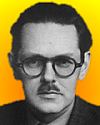 | "My belief (is) that one should take a minimum of care and preparation over first experiments. If they are unsuccessful one is not then discouraged since many possible reasons for failure can be thought of, and improvements can be made. Much can often be learned by the repetition under different conditions, even if the desired result is not obtained. If every conceivable precaution is taken at first, one is often too discouraged to proceed at all." |
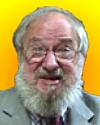 | "Nothing enrages me more than when people criticize my criticism of school by telling me that schools are not just places to learn math and spelling, they are places where children learn a vaguely defined thing called socialization. I know. I think schools generally do an effective and terribly damaging job of teaching children to be infantile, dependent, intellectually dishonest, passive and disrespectful to their own developmental capacities." |
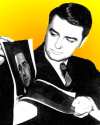 | "If you dream of something worth doing and then simply go to work on it and don't think anything of personalities, or emotional conflicts, or of money, or of family distractions; it is amazing how quickly you get through those 5,000 steps." |
| QUIZ | |
| Before you look at today's web page, see if you can answer some of these questions about the events that happened on this day. Some of the names are very familiar. Others will likely stump you. Tickle your curiosity with these questions, then check your answers on today's web page. | |
| Births | |
 |  Archer J.P. Martin, born 1 Mar 1910, was a British biochemist who was awarded a share of the 1952 Nobel Prize for developing a process where the equipment included paper. Archer J.P. Martin, born 1 Mar 1910, was a British biochemist who was awarded a share of the 1952 Nobel Prize for developing a process where the equipment included paper. |
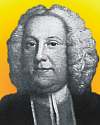 |  John Pell, born 1 Mar 1611, was an English mathematician who introduced the obelus into England. The name of this well-known symbol comes from a Greek word meaning a "roasting spit." John Pell, born 1 Mar 1611, was an English mathematician who introduced the obelus into England. The name of this well-known symbol comes from a Greek word meaning a "roasting spit."  What is this symbol? What is this symbol? |
| Deaths | |
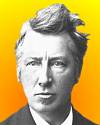 |  A physical chemist (1852-1911) was the first winner of the Nobel Prize for Chemistry (1901) for work on rates of reaction, chemical equilibrium, and osmotic pressure. A physical chemist (1852-1911) was the first winner of the Nobel Prize for Chemistry (1901) for work on rates of reaction, chemical equilibrium, and osmotic pressure.  Can you name this scientist? Can you name this scientist? |
| Events | |
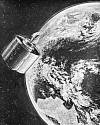 |  On 1 Mar of a certain year, direct-dialed transatlantic phone calls were made possible between the US and Britain by the combined efforts of AT&T and the British Post Office (which also then handled the British telephone system.) On 1 Mar of a certain year, direct-dialed transatlantic phone calls were made possible between the US and Britain by the combined efforts of AT&T and the British Post Office (which also then handled the British telephone system.)  In what decade were these first such phone calls made possible? In what decade were these first such phone calls made possible? |
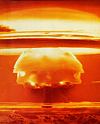 |  On 1 Mar 1954, the hydrogen bomb code-named Bravo was exploded in a test over an ocean island. With explosive power of about 20 megatons of TNT it was the most powerful of all U.S. thermonuclear bomb tests in the area. Radioactivity made the islands an unsafe wasteland, leaving the evacuated indigenous people estranged from their home soil. On 1 Mar 1954, the hydrogen bomb code-named Bravo was exploded in a test over an ocean island. With explosive power of about 20 megatons of TNT it was the most powerful of all U.S. thermonuclear bomb tests in the area. Radioactivity made the islands an unsafe wasteland, leaving the evacuated indigenous people estranged from their home soil.  Can you name the island? Can you name the island? |
| Answers |
When you have your answers ready to all the questions above, you'll find all the information to check them, and more, on the March 1 web page of Today in Science History. Or, try this link first for just the brief answers. Fast answers for the previous newsletter for February 28: Ren�-Antoine Ferchault de R�aumur; the body louse; tuberculosis; the decade including the year 1935. |
| Feedback |
 If you enjoy this newsletter, the website, or wish to offer encouragement or ideas, please send feedback by using your mail reader Reply button. If you enjoy this newsletter, the website, or wish to offer encouragement or ideas, please send feedback by using your mail reader Reply button. |
--
If you do not want to receive any more newsletters, Unsubscribe
To update your preferences and to unsubscribe visit this link


Δεν υπάρχουν σχόλια:
Δημοσίευση σχολίου